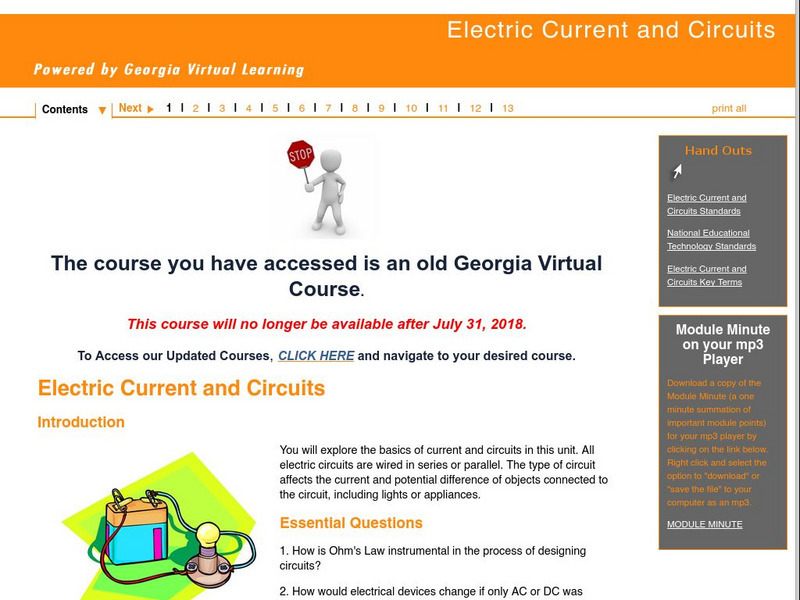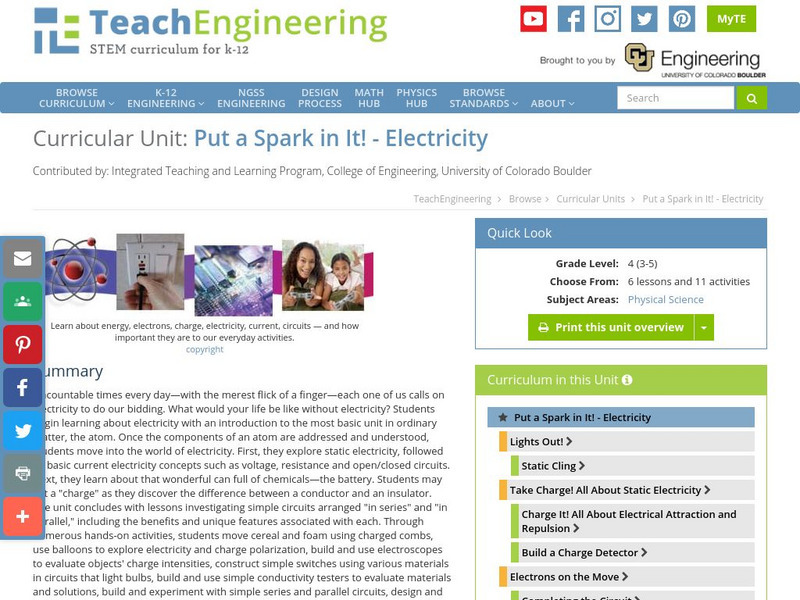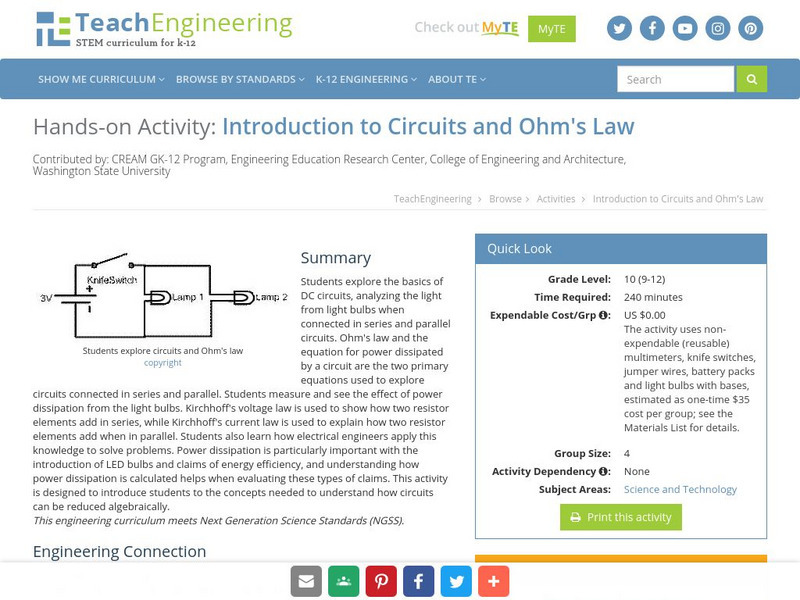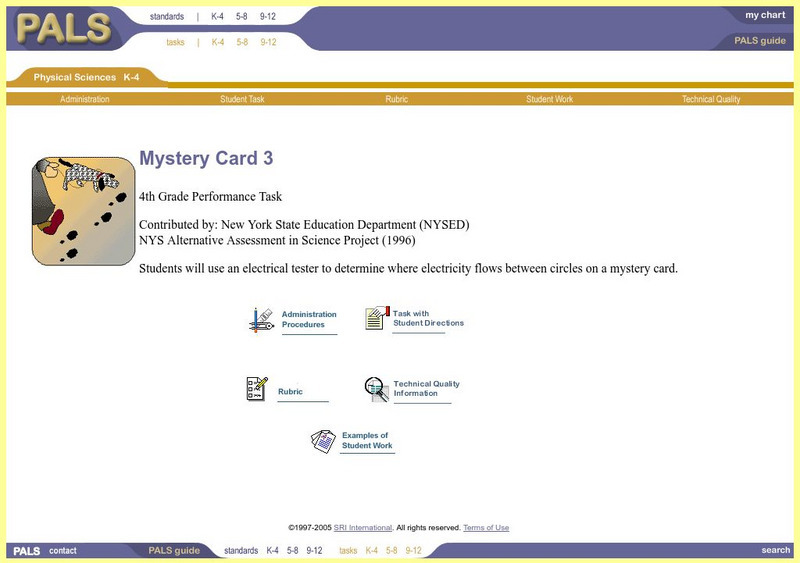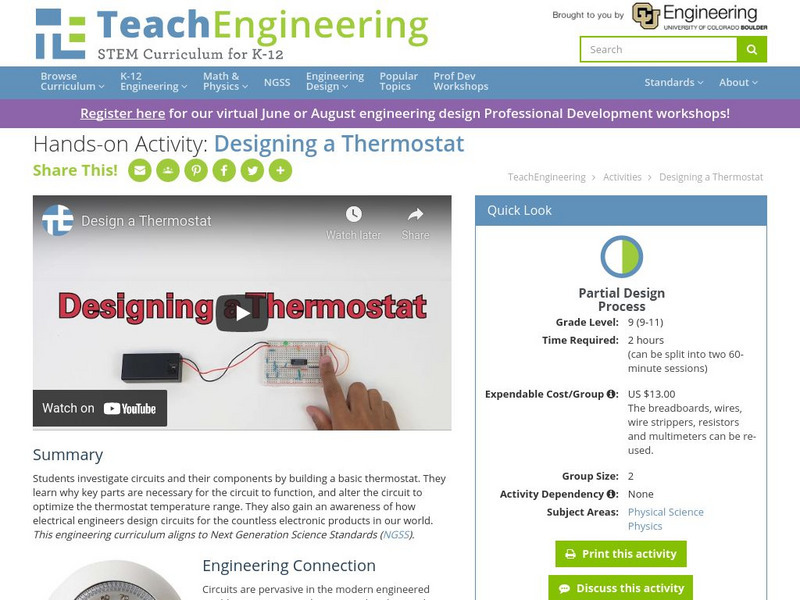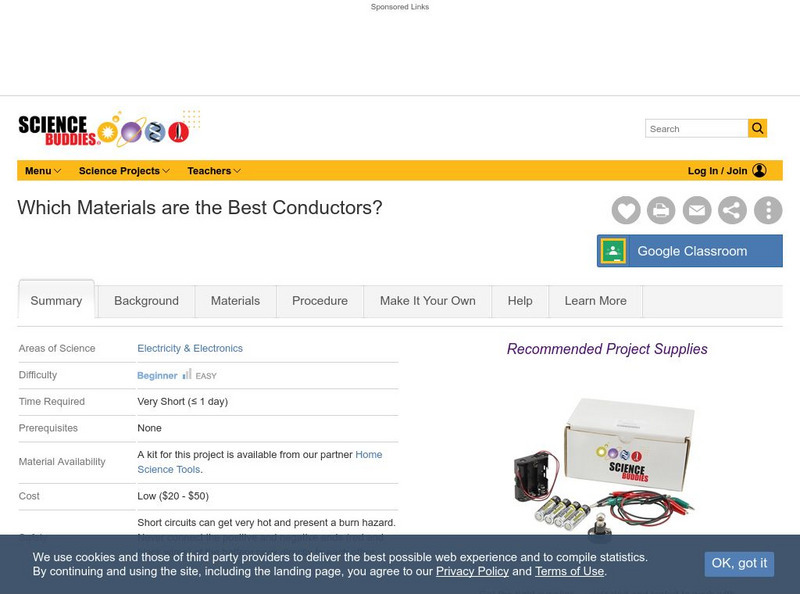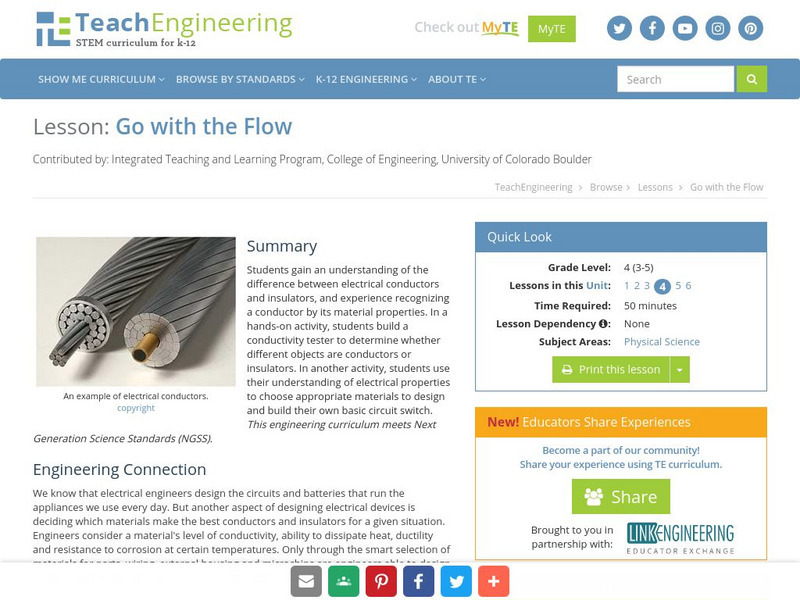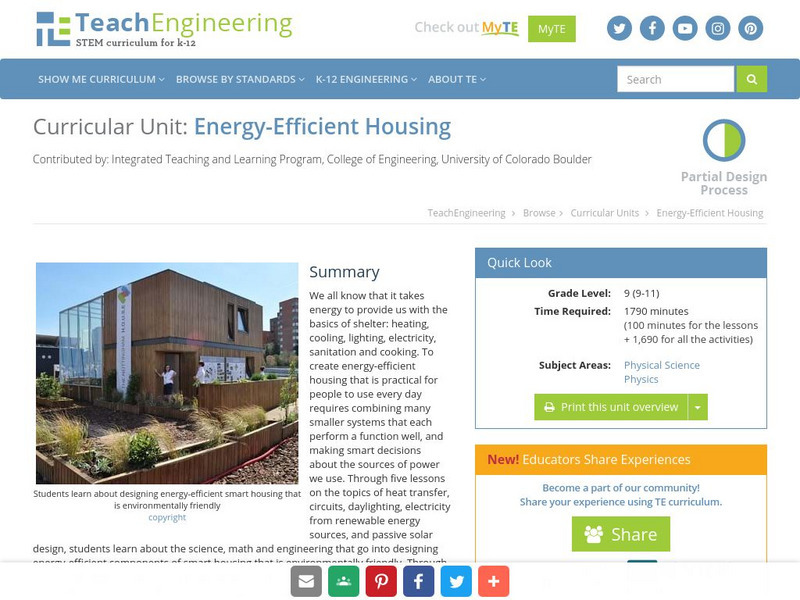Wikimedia
Wikipedia: Series and Parallel Circuits
Wikipedia offers information on two basic ways of wiring components in electrical circuits, series and parallel circuits.
Khan Academy
Khan Academy: Basic Electrical Quantities: Current, Voltage, Power
Build an intuitive understanding of current and voltage, and power.
Cosmo Learning
Cosmo Learning: Basic Electrical Technology
A collection of video lectures from a course introducing students to the basic concepts of electrical technology. Webpage includes thirty-nine lectures from a professor at the National Programme on Technology Enhanced Learning. Lectures...
Georgia Department of Education
Ga Virtual Learning: Electric Current and Circuits
Students have the opportunity to explore the basics of current and circuits in this online module. Some of the activities include interactive animations, informational text, practice problems, and lab experiments.
TeachEngineering
Teach Engineering: Put a Spark in It! Electricity
Uncountable times every day "with the merest flick of a finger"each one of us calls on electricity to do our bidding. What would your life be like without electricity? Students begin learning about electricity with an introduction to the...
TeachEngineering
Teach Engineering: Introduction to Circuits and Ohm's Law
Students will explore the basics of dc circuits analyzing the light from light bulbs when connected in series and parallel circuits. Ohm's Law and the equation for power dissipated by a circuit will be the primary equations used. Using...
South Carolina Educational Television
Know It All: Nasa Online: Circuits
Learn the basics of electrical circuits and diagrams.
Curated OER
Science Kids: Science Images: Electricity Circuit Diagram
This basic electricity circuit diagram shows a resistor and ammeter in series, a voltmeter in parallel and a switch with a cell for charging purposes.
SRI International
Performance Assessment Links in Science: Mystery Card 3
Straightforward introduction to electrical circuits using minimal materials and time. Students learn about the basics of electrical circuits by experimenting with "mystery cards" -- index cards with hidden aluminum foil used to conduct...
Khan Academy
Khan Academy: Electrical Engineering: Circuit Analysis
Circuit analysis is the process of finding all the currents and voltages in a network of connected components. We look at the basic elements used to build circuits, and find out what happens when elements are connected together into a...
Other
Easyphysics: Chapter 14 Basic Circuit
Learners investigate circuits. Some topics examined are a series circuit, parallel circuit, and Joule?s law. The resource includes practice problems with solutions and a chapter quiz.
TeachEngineering
Teach Engineering: Designing a Thermostat
Students investigate circuits and their components by building a basic thermostat. They learn why key parts are necessary for the circuit to function, and alter the circuit to optimize the thermostat temperature range. They also gain an...
Science4Fun
Science4 Fun: Resistors, Capacitors, and Inductors
Electric circuits are used to provide a path to electric current. They commonly use three basic electrical components, which are resistors, capacitors, and insulators. They affect the electric current and changes the behavior of the...
Ducksters
Ducksters: Kids Science: Electricity 101
Kid's learn about the basic science of electricity. What is it and how it works.
Khan Academy
Khan Academy: Electrical Engineering: Amplifiers
Amplifiers make signals bigger. Amplification is often the most basic operation of an electronic circuit. There are many kinds of amplifier designs. We will describe the operational amplifier, the building block of most analog electronics.
Science Buddies
Science Buddies: Which Materials Are the Best Conductors?
There are two main types of materials when it comes to electricity, conductors, and insulators. What are they made of? Find out by testing different materials in a circuit to see which ones conduct the most electricity.
Science Buddies
Science Buddies: Project Ideas: Which Materials Are the Best Conductors?
A simple science fair project to test whether electricity can flow between two things. The Science Buddies project ideas are set up consistently beginning with an abstract, objective, and introduction, followed by a section on terms,...
TeachEngineering
Teach Engineering: How Does a Robot Work?
This lesson introduces electricity, batteries and motors using a LEGO MINDSTORMS NXT robot. The associated activity guides young scholars to build a simple LEGO NXT set-up and see the practical implementation of the concepts discussed....
Science and Mathematics Initiative for Learning Enhancement (SMILE)
Smile: Simple Circuitry and Series Circuit
A teacher lesson plan which could be easily converted into an idea for a student project or presentation. This page describes an activity in which the basic nature of a circuit and the concepts of a series circuit are investigated....
TeachEngineering
Teach Engineering: Simple Coulter Counter
Students build and use a very basic Coulter electric sensing zone particle counter to count an unknown number of particles in a sample of "paint" to determine if enough particles per ml of paint exist to meet a quality standard. In a lab...
PBS
Pbs Teachers: Affairs of the Heart: Mirrored Movements
Model endoscopic surgery by constructing and operating a tool that extends a person's grasping ability, explore dexterity skills using a basic electric circuit and then design and create an improved remote tool.
Science Buddies
Science Buddies: Sliding Light: How to Make a Dimmer Switch With a Pencil
In this electronics science fair project, students will make a simple dimmer switch and investigate the relationship between the resistance in the circuit and the amount of light produced. The Science Buddies project ideas are set up...
TeachEngineering
Teach Engineering: Go With the Flow
Students gain an understanding of the difference between electrical conductors and insulators, and experience recognizing a conductor by its material properties. In a hands-on activity, students build a conductivity tester to determine...
TeachEngineering
Teach Engineering: Energy Efficient Housing
We all know that it takes energy to provide us with the basics of shelter: heating, cooling, lighting, electricity, sanitation and cooking. To create energy-efficient housing that is practical for people to use every day requires...





